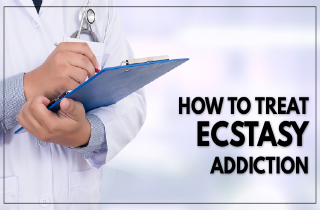Ready to get better?
There are safe ways to QUIT ecstasy.
If you think you have a problem with ecstasy use or know someone who has…you are in the right place. Addiction is a medical condition, and as such, it responds well to medical treatment. So, if you are feeling shame and guilt due to MDMA abuse, or fear to reach out for the help you desperately need…remember that substance use problems are not a moral failing.
AND, you are not alone in this!
With the right treatment program and medical professionals at your side, you can go through detox and then address the root causes that compel you to use drugs… in a secure and comfortable environment.
Here, we explain how ecstasy withdrawal and addiction are treated, and what therapies and interventions are used to help each condition. We also list helplines that you can contact to get further information or get into a rehab program that is just right for your individual case. Finally, we answer all legitimate questions about ecstasy at the end of the page.
—–
Ecstasy treatment programs can help you.
Helpline available 24 hours a day, 7 days a week.
—–
Ecstasy addiction potential
Those who think that addiction to ecstasy isn’t possible…might just be mistaken. In fact, ecstasy addicts can attest otherwise.
So, is ecstasy addictive? – The answer is that it can be! While most people do not develop physical dependence to the drug, addiction is characterized by a psychological need for ecstasy. In fact, the powerful euphoric sensations of ecstasy drive habitual use. Here is what the pattern of abuse that leads to addiction usually looks like:
Take ecstasy.
Feel high!
Use again!
Continue to use to feel high!
Then, with a chronic and repeated use like this, an ecstasy habit becomes addiction. Each time you use ecstasy, it causes your brain to flood with serotonin. Eventually, this surge of chemicals can create a deficiency of the neurotransmitter as ecstasy begins to leave your system…which leaves you needing and wanting more.
Am I addicted to ecstasy?
If you like to use ecstasy because it relieves you of social anxiety, puts you in a better mood, and produces feelings of euphoria, then you are most likely to develop an addiction to ecstasy. But, how can you know when your “harmless” experimentation with ecstasy has taken a downward turn? Possible signs and symptoms of ecstasy addiction include:
Behavioral signs of addiction:
- Continued use of ecstasy in spite of adverse effects to health, work, social or personal life.
- Increasing the amount of money you spend to get and use ecstasy.
- Popping ecstasy without even thinking about it (compulsive use).
- Using multiple illegal sources to obtain ecstasy.
Physical signs of addiction:
- Having a need for ecstasy (cravings).
- Increasing the dosage amounts or frequency in order to maintain the euphoric high.
- Being unable to stop using ecstasy even if you desire to do so.
- Experiencing severe withdrawal symptoms (a “crash”) after an ecstasy binge.
In addition, the Diagnostic and Statistical Manual of Mental Disorders (DSM-V) has a certain number of criteria that should be met for a doctor to diagnose addiction.
2-3 symptoms imply a mild disorder
4-5 symptoms point to a moderate disorder
>6 symptoms indicate a severe disorder
This means that if you recognize two (2) or more of the statements above in yourself or a loved one…chances are you might be at risk of an ecstasy use disorder. The next step for you should be speaking with your primary care physician or family doctor for referral to adequate help resources or you could seek help from a reputable treatment program directly.
—–
Addiction is not your fault!
Call us TODAY!
You deserve to live addiction-free!
—–
Therapy approaches to ecstasy addiction
Ecstasy addiction is treated using a combination of psychological and pharmaceutical therapies. A combination of the following treatments for ecstasy addiction can help:
1. Behavioral therapy and psychotherapy for ecstasy addiction
Long term psychotherapy can effectively addresses the reasons behind ecstasy use.The most effective treatments for ecstasy abuse and addiction are Cognitive Behavioral interventions that are designed to help modify your thinkin and behaviors patterns, and to increase skills in coping with life’s stressors.
But the success of this therapy approach greatly depends on the individual. Personal or group counseling is not uncommon, but family therapy is often the recommended solution when the family members act as enablers to the drug use. Although behavioral treatments for ecstasy addiction can be found at most drug rehab programs, psychologists mainly provide ecstasy addiction counseling in outpatient settings.
2. Pharmaceutical therapies for ecstasy addiction
Depression and anxiety are commonly diagnosed mental health conditions and occur frequently among addicted populations. Although there are currently no medications used in ecstasy addiction treatment, doctors can prescribe antidepressants to help with some of the psychological symptoms of withdrawal.
Treatment for ecstasy addiction
If you are wondering:
“Where can you find treatment for ecstasy addiction?”
“Who can I turn to for help with my XTC problem?”
“What does ecstasy rehab treatment entail?”
…know that there are professionals who understand your struggle, who know addiction, and can help! While most people don’t need lengthy stays in a detox facility to treat ecstasy addiction, psychological treatment is crucial. The main places to find treatment for ecstasy addiction are:
Ecstasy Addiction Treatment Centers – Treatment centers provide short and long term programs for recovery. These centers usually take a common approach to treating ecstasy addiction. This includes offering detoxification, mental and emotional support, and group therapies. Physical fitness programs are also provided to get your physical health back on track.
Ecstasy Detox Clinics – As soon as the effects of ecstasy being to wear off, your body will begin to ‘crash’ and display symptoms of ecstasy withdrawal. Some of the most common symptoms include:
- anxiety
- depression
- inability to sleep
- increased irritability
- muscle tension
- physical exhaustion
Detoxification clinics assist and monitor your physical and mental state throughout ecstasy withdrawal. Ecstasy is usually out of the system within a few days after use, but the cravings can continue for weeks or months after. During detox, you can expect to receive a combination of medical attention and counseling to cope with any feelings of discomfort. Physical therapy with a unique combination of exercise is also often incorporated to help your body regulate symptoms of tiredness and insomnia.
Ecstasy Addiction Support Groups – Drug addiction support groups can be very effective when combined with behavioral interventions to support drug free recovery over a long period of time.
Psychologists and Psychiatrists – For a full recovery from addiction, you will need to address the underlying psycho-emotional reasons which compel ecstasy use. Past traumatic experiences or unhealthy coping skills can be integrated into a more holistic approaches on life. In fact, some feel that the best way to identify and change negative thought patterns and beliefs is through psychotherapy. Therapists are trained to guide you through personal change and can fuel your motivation for a drug free life. Psychiatrists can also support your mental health, and can prescribe necessary medications for dual-diagnosis cases.
Is inpatient or outpatient right for me?
It depends on your needs.
Making the choice to enter an inpatient or an outpatient ecstasy rehab program should come after you understand what each type of rehab setting offers and what are your individual goals in recovery.
Inpatient ecstasy addiction treatment offers living arrangements within the treatment facility. This way, in addition to providing moral support and therapy, a treatment program can offer you a safe, drug-free, and distraction-free environment in which to recover. Outpatient rehab, on the other hand, allows you to go about your daily work or school obligations and still live at home, but also get the needed addiction treatment you need. Therapy sessions can be scheduled daily, several times a week, or a few times per month.
QUESTION No. 1 – Who’s inpatient rehab for?
Type of treatment is generally recommended for those suffering from a severe ecstasy addiction, who need more structured schedule of therapy, and need to be removed from their living environment due to various reasons that may jeopardise early recovery. The length of time you spend in the program an range from one month (the base minimum time period required to recover) to several months (for more severe cases of ecstasy addiction).
QUESTION No. 2 – Who’s outpatient rehab for?
Outpatient rehab treatment is fit for those suffering from a less severe ecstasy addiction or who have a high motivation to stay off the drug. It is also important that a person entering an outpatient program lives in a healthy, sober environment where the people closest to them are understanding of the condition and supportive of recovery. This type of programs can also be an effective treatment option for those who can’t leave work or family obligations for an extended period of time.
Got any questions?
We are here to help you get them answered!
If you are unsure about ecstasy addiction treatment or wonder if you have a problem with ecstasy at all…there are ways to get answers. We invite you to send us your questions via the comments section below. We do our best to provide personal and prompt responses to all legitimate inquiries.










Related Posts